- Home
- Chris Ryan
The Bay Bulls Standoff Page 2
The Bay Bulls Standoff Read online
Page 2
The officers called the Crockwell home but Leo didn’t answer. No big deal: the man could have been in the shower. This was relayed to St. John’s. The officers in Bay Bulls were told to hold tight, St. John’s was sending in a SWAT team. Sharpshooters were on the way to Bay Bulls. It was forty-five minutes after Wade Mullowney had first contacted the RCMP in Witless Bay. Two hours after that first contact, RCMP marksmen would be at strategic locations around the Crockwell home.
The residents of Bay Bulls were dumbfounded. They were asking, Was there a need? They were also asking why mental health experts had not been sent.
When the RCMP’s elite tactical squad arrived in Bay Bulls, the decision was made to clear all dwellings within 800 to 1,000 feet of the Crockwell house. Businesses close to the Crockwell house were ordered to close. Homeowners and business owners were told that this would only be a temporary inconvenience. Most likely everything would be back to normal within a few hours, the RCMP said. Definitely by dark.
By this time, the St. John’s media had arrived: the Telegram, CBC, VOCM, NTV. It was noon when most of the reporters got to Bay Bulls, and they wanted coffee and sandwiches.
A young Telegram reporter decided to go to Foodland for a sandwich and coffee, but the parking lot had been barred off with orange pylons. It was full of police officers in their cruisers. He decided to cruise around town, maybe find a local who could direct him to a spot where he could grab a bite to eat.
He took the first left after Foodland. This road, Cemetery Lane East, is south of the Crockwell house, giving a decent view of Crockwell’s. After he had travelled a short distance, the reporter came across an older man leaning on a fence post outside his house. He pulled his car over, parked, and got out. He introduced himself to the man, told him he was a reporter for the St. John’s Telegram, and asked why Foodland was closed. The man said that not only was Foodland closed, four or five other businesses in the area were closed as well.
The reporter seemed surprised by this. Foodland wasn’t that close to the Crockwell house, he said; it was odd to shut down so many businesses early in a domestic dispute situation. But he figured the RCMP knew what they were doing. He asked the man where he could get a sandwich and a coffee. The man replied that his wife had just put on a pot of coffee and that the reporter was more than welcome to go to his house for a bit of lunch. Sure, the wife could muster up a sandwich quicker than you could say quick. The reporter took the man up on his offer. He was hungry and he had a feeling that it was going to be a long day. Also, making contact with a local resident was a good way to get some information on the person holed up in the house on St. John’s Road.
The local man is a bit of a case, a storyteller who loves to talk. He told the young reporter that the person holed up in the green house was Leo Crockwell, a gent of approximately fifty-five years of age. You could not find a nicer person in the harbour if you looked high and low, he said. What happened to set Leo off was a mystery to him.
After lunch, the two men moved outside. Before they did, the reporter thanked the man’s wife for the sandwich and the coffee. She told him that if he wanted a coffee anytime during the day just drop in. “No need to knock,” she said, “our door is always open. If you don’t see anyone, just fill your Thermos. I’ll leave the coffee brewing for the rest of the day.” She also mentioned that he was welcome to come by if he needed a washroom during the afternoon, although both she and her husband would probably not be at home.
The reporter couldn’t believe what he was hearing. These people were going to allow him access to their home when they weren’t there? He found this generous beyond words, but he had heard how friendly the crowd on the Southern Shore were, with their Irish roots. He would get to witness this many times during the eventful week that followed.
The two men couldn’t believe the crowd that had gathered on Cemetery Lane East. Cars were bumper to bumper. This didn’t surprise the reporter’s host: he knew that Cemetery Lane East was one of the better vantage points for getting a good look at the Crockwell house. The two men decided to stroll down the road for a look themselves. They came across two locals, Walter Puddester and a younger chap by the name of Trevor Poole. The boys were sipping on beers. Why not? It was Saturday and their week’s work was behind them. These fellows were known to be some of the hardest-working fishermen in Bay Bulls. They were excited to see the older man: they figured he would be in possession of a bit of the local gossip on what was transpiring over at Leo’s.
To their surprise, he knew no more than they did. All he could add was that Cathy and Marg Crockwell were at Wade Mullowney’s house on Track Road Extension. Walter Puddester also lived on this road, close to Wade and Mary’s.
“When was the last time you saw so many cop cars in Bay Bulls?” Walter asked the old gent.
“I’d have to say maybe back when Brian Smith was charged with the murder of Jerome Fleming,” he replied.
“How long ago was that?” asked Trevor. He was a very young lad when the murder happened, on April 5, 1984.
Brian Smith always claimed he never committed the murder of his best friend, thirty-one-year-old Jerome Fleming, but he was convicted of second-degree murder by a jury on February 21, 1985. Right up to the time of his death, on February 4, 1994, Smith said that he didn’t commit the murder. He was granted bail and released from federal prison in November 1993 because he was dying of cancer.
As the story of the standoff started getting out through the media, Bay Bulls began to swarm with cars, hundreds of them. A fair number of their occupants were townies. The standoff was close enough to the city that people decided to make a run down here for a quick look. But they didn’t get to see anything. The police perimeter around the house was so large that in order to get a good look you needed a decent pair of binoculars, or at least know exactly where the elevated parts of town were. Most of the people from St. John’s had no idea where to go, and so they went back to town to watch the standoff on TV later in the evening.
By now the RCMP were beginning to realize that this was going to take longer than they had thought.
They needed a command post, one big enough to house thirty to forty police officers. One that contained all the amenities: fax machines, a computer or two, the Internet, multiple phone lines, a washroom or two, most likely a kitchen or kitchenette. A large parking lot would be an asset.
The Ferryland officers were tasked with finding a suitable place. The RCMP had been guaranteed office space in the new town hall. From Foodland, which was to become the command post site where the mobile command post truck would be situated, it was only a few hundred feet to the bridge, hang a left, drive east, southeast, and you were there. The town hall is on the corner of Cemetery Lane East and Southside Road.
The new town hall had been open and in operation for less a year. The old parish hall had been torn down to make room for it. That parish hall had been a very busy building over the years. People would come from Petty Harbour to Ferryland for dances on Saturday night, dances that were guaranteed to include many fist fights. Our family lived across the road from the parish hall. I remember standing on the edge of our bathtub as a child, in the 1970s, with my little brother Pius watching fights taking place outside the hall. The whole community used to go to the annual garden party at the parish hall, the biggest event of the year on the Southern Shore.
Although the RCMP had been designated offices in the new town hall, they were not ready. One of the officers decided to contact the mayor of Bay Bulls, Harold Mullowney, brother of Wade.
Harold was at home when the officer called. He started to explain the situation to Harold, but Harold interrupted him, saying there was no need to explain: he was on top of events. He was a very close friend of Leo’s, he said, and he held Leo in very high esteem. They had lived next door to each other all their lives. The situation could take some time to resolve, Harold told the officer:
Leo was a determined man. He would exit the house when he was good and ready, on his terms and no one else’s.
Harold offered the town hall as a temporary post. He said he would contact the deputy mayor, Don Drew, and the town councillors to get their permission. He was sure it wouldn’t be a problem. The building wasn’t being used on the weekend anyway, and surely everything would be over by Monday.
Back in the gravel pit, real estate was getting harder and harder to get. Night was starting to fall on Bay Bulls and there was no sign of movement at the Crockwell house. Zero details were being revealed. All we knew was how it had started. The talk at the pit was who was going to come back for a few hours after supper. I said I’d definitely be back. Why not? All my girlfriend and I ever do on a Saturday night is watch TV shows like Cops and America’s Most Wanted. Sure, why watch them when we could be watching the real thing live right here in our hometown?
Off to my girlfriend’s house in Witless Bay I went. She knew I was planning to go back to the gravel pit after supper, so she had grub ready for me the minute I walked through the door.
Before I sat down at the table, my cellphone rang. It was Kevin O’Brien, known locally as Kevin Plumber. (Everyone in Bay Bulls has a nickname.) Kevin’s father, Jimmy, had been a plumber at the shipyard in St. John’s.
“Hey, Dutch, you’re not going to believe this.” Dutch is my nickname.
“Believe what?”
“Donna Glynn is walking up Irish Town Road.”
“What?”
“Donna is strolling up Irish Town Road.”
No big deal. But Irish Town Road is directly behind St. John’s Road.
I said, “Kevin, if they see her they will apprehend her again. Sure, they brought her home today.”
What was I going to do? I had to get to her before the cops or they would detain her for the night. Twice was pushing it. I was sure they warned her not to go handy to St. John’s Road.
I grabbed the phone book and immediately went to O for O’Driscoll. Sharon O’Driscoll is an old friend of mine, and she and Donna were pretty thick. But then it hit me: Sharon wasn’t allowed in her house because it fell within the police perimeter around the Crockwell house. I decided to try calling anyway. No answer, exactly what I expected. Shit, shit, shit. Who could I call? By this time I was panicking. I knew that if the cops saw Donna she would be spending the night locked up in Ferryland or Holyrood. I tried Brenda Puddester’s number; Brenda hung out with them as well. Her grandmother, Mrs. Anne, picked up. Mrs. Anne is the sweetest lady in Bay Bulls.
She said, “This you, young Ryan?”
I said that it was and that I was looking for Brenda. She told me she hadn’t seen Brenda since she left the house at 11:30 a.m.
“Isn’t it shocking what is going on with poor old Leo Crockwell?”
I agreed with her. I said, “Please God this will end soon, with no one getting hurt.” I asked her to tell Brenda to give me a call if she showed up in the next twenty minutes or so. I gave her my cell number and said good night.
Who else could I call? Judy Maloney, my stepsister. Judy lives on the north side of the harbour, on Alley Road. She hung out with Donna and Sharon, too.
Judy’s daughter, Natasha, answered on the first ring. I asked if her mother was home, and she said yes. When Judy picked up, I said, “Judy, you are not going to believe this. Donna is walking up Irish Town Road.”
“What?” Judy said. “Who the hell told you that?”
“Kevin O’Brien called me, just as I got to Tina’s for supper. Like, two minutes ago.”
“No, he’s bullshitting you.”
“Judy, no. Kevin wouldn’t joke about something like that. He knew about the cops nabbing Donna earlier in the day. So he definitely was not lying or bullshitting. He’s not a joker. It’s not his style, anyway. He knows the ramifications if the cops get to her before her friends.
“I’m trying to find Sharon. Do you know where she is? I know she doesn’t have a cellphone.”
“I don’t know where she is. She dropped me off just as it got dark and said she was going to the town hall to talk to the cops to see if they will let her go get her dog, Peanut. She left him in her house today when the cops knocked on her door and ordered her out. Just before noon. I can’t go get her. My shitbox is broken down. I’ll get on the phone and track her down. Thanks for calling.”
“Judy, please, find someone to get Donna quickly. If not, you know as well as me where she’ll spend the night.”
I thought about asking Plumber to go get her, but I knew Donna wouldn’t get in with just anybody. When Donna has her mind made up, you can’t change it. She’s a lot like her cousin Leo that way.
I sat down to enjoy the meal prepared by my sweetheart, knowing that there was nothing more I could do for Donna, only hope and pray that one of her girlfriends could get to her before the police did. I knew that by the time I got back to Bay Bulls they would definitely have her, if they didn’t already. Bay Bulls was crawling with cops, probably three to four of them for every acre of land on that side of the harbour. They had the area completely covered, from the bridge by the gut to the intersection with the Southern Shore Highway by Foodland. Irish Town Road was covered, from the church to where it hits the highway across from Lower Path. If Donna walked past the two cop cars by the church on St. John’s Road, it would be called in to the command post at the town hall.
But did she walk past these cars? Or did she get to Irish Town from behind the church?
I wolfed down my grub, hauled on a pair of insulated jeans, and grabbed a woollen blanket. My binoculars and scope are impossible to use with the windows up, especially in new vehicles whose windows are tinted when they leave the factory.
I got back to the gravel pit at six o’clock, roughly thirty minutes after I left. There were still cars everywhere, a lot of them strange cars, a lot of them cars that weren’t there before. They were parked bumper to bumper. This was exciting. What better to be at on a cold winter’s night in Bay Bulls, or any rural community in Newfoundland for that matter? As soon as I arrived, two or three cars moved so that I could get into a good position with my binoculars and scope.
I started asking the boys if anyone had seen Sharon O’Driscoll. The reply was negative. I told them about the call from Kevin O’Brien concerning Donna. The boys laughed their heads off. They couldn’t believe that Donna would try to get to Leo a second time. Was she out of her mind? How the hell was she going to penetrate that perimeter around the house? There were dozens of sets of eyes on that house and more were being added every hour. We probably weren’t the only ones with a scope and a pair of binoculars focused on Crockwell’s. We suspected the police most likely had a perch much like ours from which they were watching the house. But if they did . . . where was it? We scanned the whole harbour, every hill and outcrop we knew.
By now we were starting come to the realization that the situation could go on for a while. We could see the town hall from the pit, and my scope showed that the yard was full of RCMP cruisers and black or dark blue Suburbans. And ghost cars.
The building was lit up like a Christmas tree. I wondered if the RCMP or the Department of Justice would offer to pay the town council for the use of our town hall and cover the cost of extra heat and light for the duration of the standoff. Would they pay those who had had their homes commandeered?
The temperature was starting to drop. The last weather report from VOCM had stated that it was three degrees Celsius with a forty-knot wind from the east. With the wind blowing like that, the temperature was more like minus three. It was bloody freezing, much colder than it had been in the afternoon. I was glad I had the insulated jeans on, and a wool blanket wrapped around me. I was grateful for my toque and mitts. You would swear I was at the Southern Shore Arena watching my hockey-hungry nephews Jared Ryan, Jeff Walsh, and Noah Harr
igan play the game they love. The RCMP would be wrapped up warm tonight, too.
Brenda Puddester showed up. I asked her if she got the message that I left with her grandmother. She said no, she hadn’t been home. She’d grabbed a feed of fish and chips at Paddy’s and gone to Randy “Cat” Mulcahy’s. She’d wanted to find out if Randy and his girlfriend, Darlene Howlett, had any news. Brenda figured that Randy might know if Mrs. Crockwell and Cathy were still out at his sister Mary’s. Randy is Mary Mullowney’s brother. In small communities in rural Newfoundland, nearly everyone is related.
I filled her in on Donna’s doings.
She laughed. Then she looked at me with a worry in her eyes. “Are you serious? Dutch, you’re bullshitting. Please tell me you’re joking.”
“Yes, serious, and I don’t know what happened to her. Oh Donna, oh Donna.”
“I have to go find Sharon,” Brenda said. “Sharon will die laughing when she hears this. She might laugh, but she’ll be pissed with Donna for trying that stunt again. Twice in one day.”
So off Brenda went, down the top road. She took a right at Ryan’s Lane and passed the old elementary school, which is now an apartment building. The lane is connected to Cemetery Lane East and goes directly to the town hall. That’s where she found Sharon, as comfy as could be. She was enjoying the heat and a coffee and a sandwich; the townsfolk had dropped coffee and grub off to the RCMP officers. Brenda quietly filled Sharon in on what was transpiring with Donna, but Sharon didn’t believe it. Brenda had to repeat it. Sharon told Brenda she didn’t want to question the officers about Donna. She had already asked them about getting her dog, Peanut. They’d told her to come back the next day. Most likely she would be allowed to go get Peanut even if the incident wasn’t over. Sharon wasn’t about to press her luck and start asking about Donna.

 Global Strike
Global Strike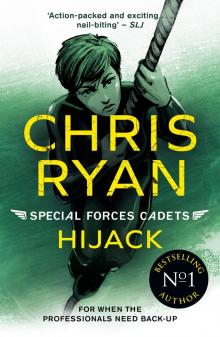 Hijack
Hijack Special Forces Cadets 2
Special Forces Cadets 2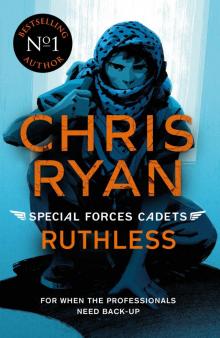 Ruthless
Ruthless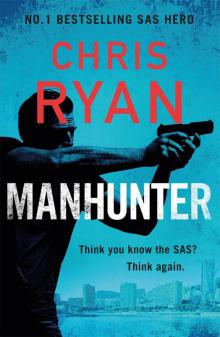 Manhunter
Manhunter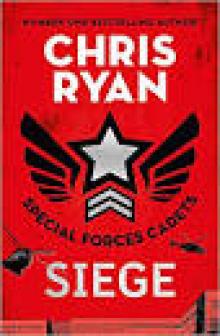 Special Forces Cadets 1
Special Forces Cadets 1 Red Strike
Red Strike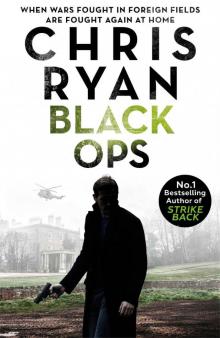 Black Ops
Black Ops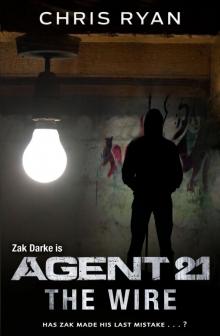 Agent 21: The Wire
Agent 21: The Wire Land of Fire
Land of Fire Alpha Force: Fault Line
Alpha Force: Fault Line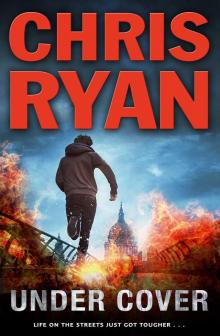 Under Cover (Agent 21)
Under Cover (Agent 21) Endgame (Agent 21)
Endgame (Agent 21) Red Centre
Red Centre Blackout
Blackout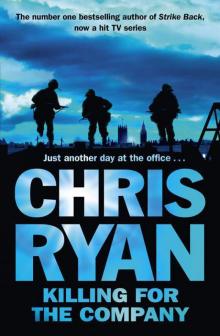 Killing for the Company
Killing for the Company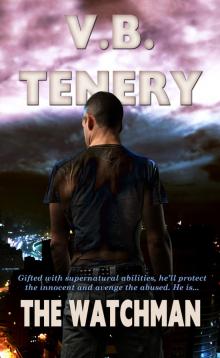 The Watchman
The Watchman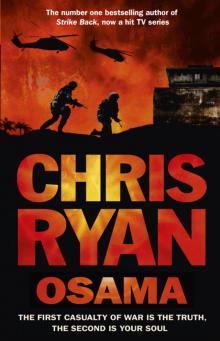 Osama
Osama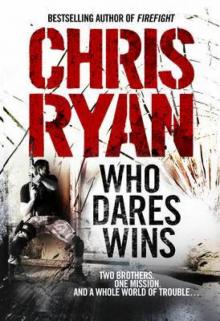 Who Dares Wins
Who Dares Wins The Kremlin Device
The Kremlin Device Hunter Killer
Hunter Killer Alpha Force: Untouchable
Alpha Force: Untouchable Stand By Stand By
Stand By Stand By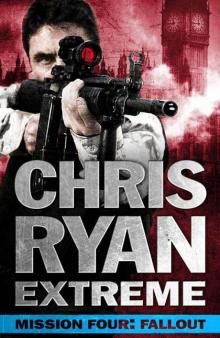 Chris Ryan Extreme: Hard Target: Mission Four: Fallout
Chris Ryan Extreme: Hard Target: Mission Four: Fallout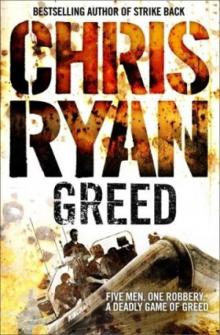 Greed mb-1
Greed mb-1 Alpha Force: Desert Pursuit
Alpha Force: Desert Pursuit Strike Back
Strike Back Greed
Greed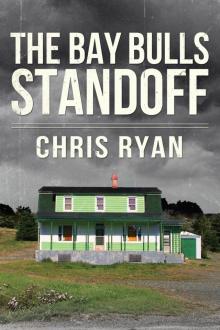 The Bay Bulls Standoff
The Bay Bulls Standoff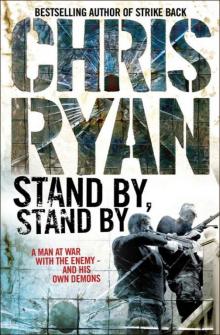 Stand By, Stand By gs-1
Stand By, Stand By gs-1 Outbreak
Outbreak Hunted
Hunted Vortex cr-4
Vortex cr-4 Rat-Catcher
Rat-Catcher Vortex
Vortex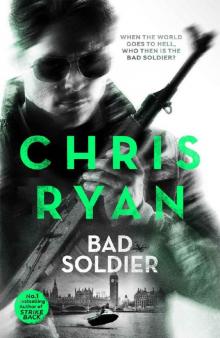 Bad Soldier
Bad Soldier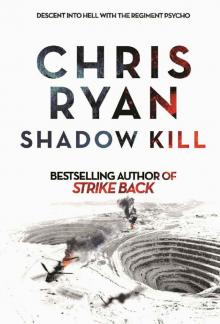 Shadow Kill: A Strikeback Novel
Shadow Kill: A Strikeback Novel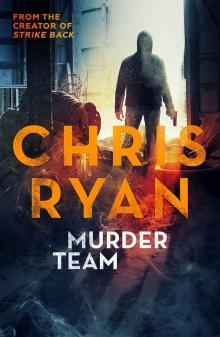 Murder Team (Kindle Single)
Murder Team (Kindle Single) One Good Turn
One Good Turn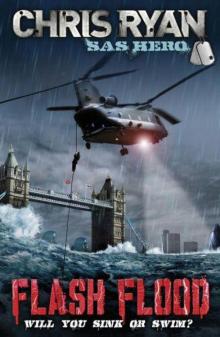 Flash Flood cr-1
Flash Flood cr-1 Night Strike
Night Strike Wildfire
Wildfire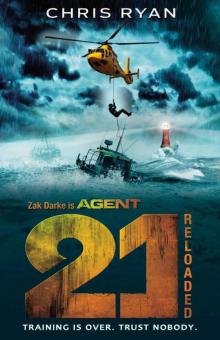 Agent 21: Reloaded: Book 2
Agent 21: Reloaded: Book 2 Chris Ryan Extreme: Hard Target: Mission Two: The Rock
Chris Ryan Extreme: Hard Target: Mission Two: The Rock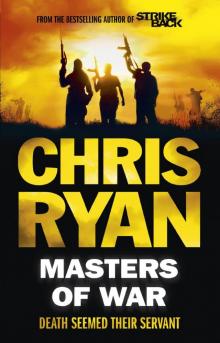 Masters of War
Masters of War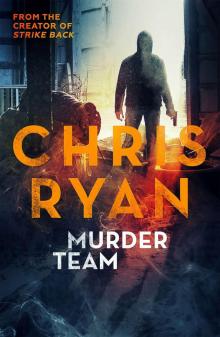 Murder Team
Murder Team War Dog
War Dog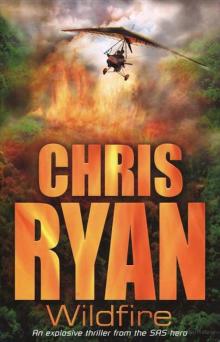 Wildfire cr-2
Wildfire cr-2 Survival
Survival The One That Got Away - Junior edition
The One That Got Away - Junior edition The Hit List
The Hit List The Kill Zone
The Kill Zone Medal of Honor
Medal of Honor Battleground
Battleground Twister
Twister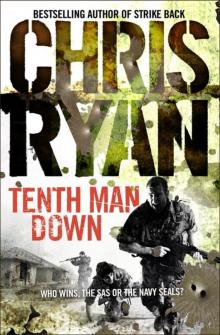 Tenth Man Down gs-4
Tenth Man Down gs-4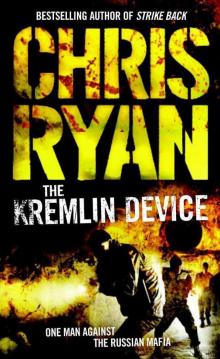 The Kremlin Device gs-3
The Kremlin Device gs-3 Hostage
Hostage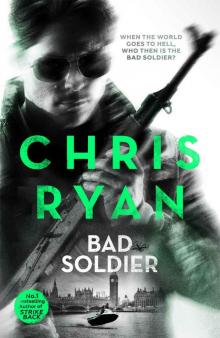 Bad Soldier: Danny Black Thriller 4
Bad Soldier: Danny Black Thriller 4 Alpha Force: Blood Money
Alpha Force: Blood Money Firefight
Firefight Chris Ryan Extreme: Hard Target: Mission One: Redeemer
Chris Ryan Extreme: Hard Target: Mission One: Redeemer Hit List
Hit List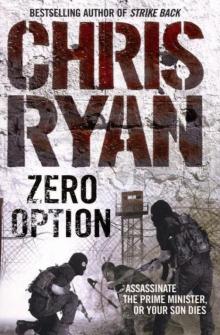 Zero Option gs-2
Zero Option gs-2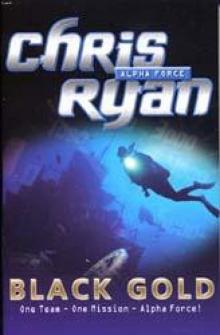 Black Gold
Black Gold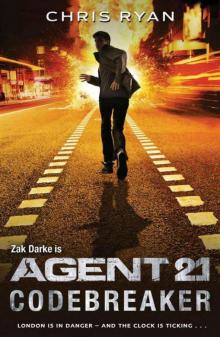 Agent 21: Codebreaker: Book 3
Agent 21: Codebreaker: Book 3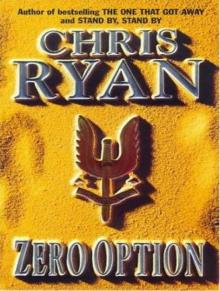 Zero Option
Zero Option Ultimate Weapon
Ultimate Weapon Tenth Man Down
Tenth Man Down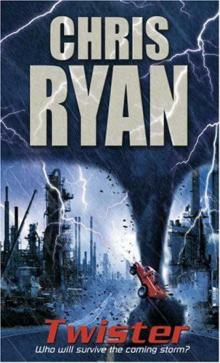 Twister cr-5
Twister cr-5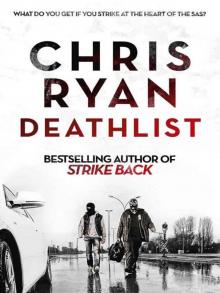 Deathlist
Deathlist Hellfire
Hellfire Flash Flood
Flash Flood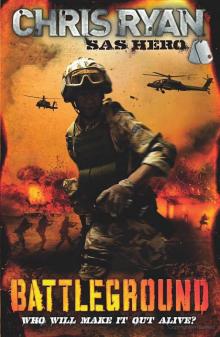 Battleground cr-6
Battleground cr-6 The Increment
The Increment